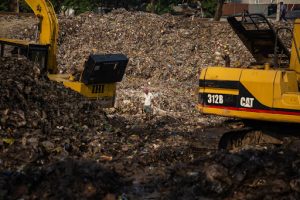When most people think of waste management, they think about the trash that accumulates in their homes on a weekly basis. However, there is much more to waste management than just residential garbage. Businesses and industries produce a great deal of waste as well, and it is important to have systems in place to collect and dispose of this waste properly. In this blog post, we will discuss 10 tips for reducing your environmental impact through effective waste management practices!
Table of Contents
Tip 01: Dispose of Hazardous Waste Properly
Hazardous waste must be disposed of properly in order to protect both the environment and human health. Make sure you have a system in place for collecting and transporting hazardous waste to the appropriate disposal facility. Also, ensure that your employees know various types of waste, or you can find out more about aggregates here.

Tip 02: Establish Recycling Procedures
In addition to educating your employees, you should also establish recycling procedures for your business or industry. This will ensure that recyclable materials are not accidentally thrown away and that they are properly collected and transported to the appropriate processing facility.
Tip 03: Reduce Packaging
One of the best ways to reduce your waste output is to reduce the amount of packaging that you use. This can be done by choosing products with less packaging or by recycling and reusing packaging whenever possible. You can also encourage your suppliers to reduce the amount of packaging on their products.
Tip 04: Use Recycled Materials
When possible, use recycled materials in place of virgin materials. Not only will this help reduce your environmental impact, but it can also save you money on production costs.
Tip 05: Implement a Green Procurement Policy
A green procurement policy is one of the best ways to reduce your environmental impact through waste management. This policy requires that all suppliers adopt environmentally friendly practices, such as reducing packaging and using recycled materials.
Tip 06: Educate Your Employees
One of the best ways to reduce your environmental impact through waste management is to educate your employees on proper waste disposal practices. Make sure everyone in your organization knows which items can be recycled and which should be thrown away.

Tip 07: Donate or Sell Scrap Materials
Instead of throwing away scrap materials, donate or sell them to organizations that can reuse or recycle them. There are a number of different ways to find organizations that will take your scrap materials, so do some research and find one that is right for you.
Tip 08: Reduce Food Waste
Food waste is a major problem in the United States, and it has a significant environmental impact. Make sure you are properly storing and disposing of food waste in order to reduce your contribution to this problem.
Tip 09: Use Reusable Products
Whenever possible, use reusable products instead of disposable ones. This includes items like cups, plates, and utensils. Not only will this help reduce your environmental impact, but it can also save you money in the long run.
Tip 10: Educate Your Community
One of the best ways to reduce your environmental impact through waste management is to educate your community on proper waste disposal practices. Make sure everyone knows which items can be recycled and which should be thrown away.
By following these tips, you can make a significant difference in the amount of waste you produce each year. Not only will this help reduce your environmental impact, but it can also save you money and resources. Implement as many of these tips as possible in order to create a sustainable and eco-friendly environment for yourself and your community.
Did you find this article helpful? Share it with your friends so that they can learn more about waste management and how to reduce their environmental impact!



